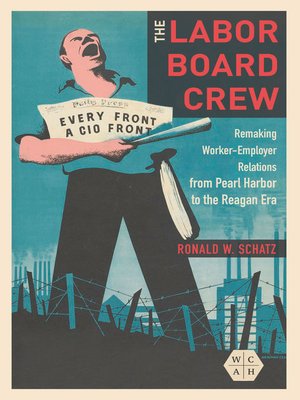The Labor Board Crew
ebook ∣ Remaking Worker-Employer Relations from Pearl Harbor to the Reagan Era · Working Class in American History
By Ronald W. Schatz

Sign up to save your library
With an OverDrive account, you can save your favorite libraries for at-a-glance information about availability. Find out more about OverDrive accounts.
Find this title in Libby, the library reading app by OverDrive.



Search for a digital library with this title
Title found at these libraries:
| Library Name | Distance |
|---|---|
| Loading... |
Schatz argues that the Labor Board vets, who saw themselves as disinterested technocrats, were in truth utopian reformers aiming to transform the world. Beginning in the 1970s stagflation era, they faced unforeseen opposition, and the cooperative relationships they had fostered withered. Yet their protégé George Shultz used mediation techniques learned from his mentors to assist in the integration of Southern public schools, institute affirmative action in industry, and conduct Cold War negotiations with Mikhail Gorbachev.
|PrefaceAbbreviations and Acronyms
1 In the Wake of Pearl Harbor
2 George Taylor and the War Labor Board, 1942-45
3 On Top of the World, 1946-56
4 Down-to-Earth Utopians
5 War and Peace in Steel, 1959-72
6 When the Meek Began to Roar: Public Employee Unionism in the 1960s
7 "How Can We Avoid a Columbia?" The Student Revolt, 1964-71
8 A Whole Different Ball Game, 1968-81
9 George Shultz at the Negotiating Table
10 Doing the Lord's Work
Acknowledgments
Notes
Index|"A fascinating and unusual book that traces the emergence and impact of a generation of labor relations professionals who left their stamp not only on the field in which they were trained but also higher education, urban politics, foreign policy, sports and much more." —ILR Review
"Masterfully crisp and energetic writing." —Chronicle of the National Academy of Arbitrators
"Amazing new book. . . . Getting past inertia and suspicion has been difficult in an era of neoliberalism and hyper-nationalist politics. Even if the world of the Labor Board vets no longer exists, it was arguably the period American workers did their best economically. In helping us to rethink assumptions about the era, Schatz has done admirable work." —Register of the Kentucky Historical Society
|Ronald W. Schatz is a professor of history at Wesleyan University. He is the author of The Electrical Workers: A History of Labor at General Electric and Westinghouse, 1923–60.







